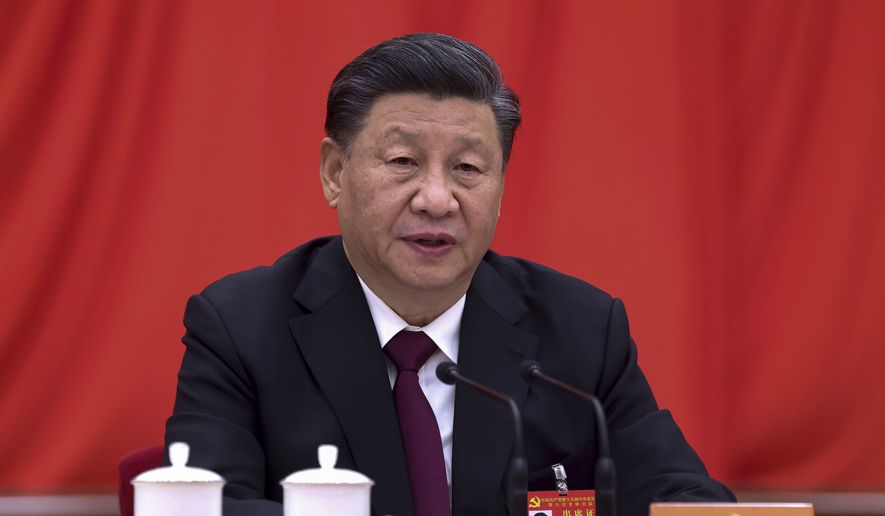President Biden will raise issues such as China’s recent stepped-up military coercion of Taiwan, human-rights abuses and Beijing’s weakening of the international order Monday at his first face-to-face, virtual summit with Chinese President Xi Jinping.
The two leaders are expected to speak for several hours in the evening by secure teleconference as part of Mr. Biden’s attempt to set “guard rails” for U.S.-China relations in a bid to avoid a conflict, according to a senior administration official who briefed reporters on the meeting.
“The president will be very direct and candid about areas where we have concerns about China’s behavior,” the official said.
Those areas include threats posed by China to the rules-based international order, unfair economic practices like government support for Chinese industry, economic coercion of foreign nations, and “China’s coercive and provocative behavior with respect to Taiwan,” the official said.
China in recent weeks has conducted large-scale aerial incursions into Taiwan’s air-defense zone, at one point sending more than 150 warplanes to menace the self-ruling island’s government.
China also has been carrying out large-scale naval exercises that appear to be practice for an invasion of the island, located about 100 miles off the Chinese coast.
SEE ALSO: Biden administration rejects Chinese ‘Maoist’ demands for policy changes
During the summit, Mr. Biden will also bring up Chinese technology theft and cyberattacks.
Mr. Biden will press Mr. Xi on human rights, such as the crackdown on democracy in Hong Kong and mass repression of Muslim Uyghurs in Xinjiang, where as many as 1 million people have been placed in concentration camps.
“I would note that these are differences that need to be addressed directly, not in some way put to the side as China would often like to do,” the official said.
Despite the differences, Mr. Biden hopes to enlist Mr. Xi’s help on potential areas of “alignment,” such as climate change and health security, the official said.
China is the world’s largest emitter of greenhouse gases and has promised to meet international reductions by 2060, when most current world leaders likely will be dead.
No specific agreements are expected as a result of what the White House is calling “leader-level engagement” aimed at ensuring competition does not spiral out of control.
“This is not a meeting where we expect deliverables to be coming out,” the official said.
The official said the extensive engagement and interaction of the past between the United States and China has changed sharply. Until 2017, Washington sought extensive trade and economic ties with Beijing and often ignored Chinese illicit activities.
“Our two countries are in a fundamentally different place with each other than we have been in the past,” the official said.
The Biden administration is pursuing a dual-track approach to China that seeks to confront Beijing on its threatening activities both in China and abroad, while simultaneously pursuing cooperation on issues such as climate change.
So far, Chinese leaders have balked at the approach. Instead, the Chinese are demanding that the United States abandon hardline policies put in place during the Trump administration.
“We believe intense competition requires intense diplomacy,” the senior official said of the idea behind the virtual summit.
Mr. Biden hopes to make clear to Mr. Xi all U.S. intentions and goals regarding the global competition.
“The Biden administration is not trying to change China through bilateral engagement,” the official said. “Rather we are trying to shape the international environment in a way that is favorable to us and our allies and partners.”
The meeting comes against the backdrop of a Chinese Communist Party meeting last week that further cemented Mr. Xi’s position as supreme leader of China who has abandoned the past practice of serving only two terms as party general secretary and chairman of the Central Military Commission, the power behind the party.
The senior official said Mr. Biden hopes to match the Chinese leader and his strengthened position by signing the $1 trillion infrastructure bill prior to the summit.
The point of the bill signing will be to emphasize to Mr. Xi that the United States is strengthening its position to be able to more effectively compete with China on the world stage, the official said.
On confronting China on the “rules of the road” regarding international disputes, Mr. Biden is expected to make the point that the current system is based on principles embraced by many nations.
The president will push to keep a system built on democratic norms and principles, the official said.
China is expected to raise the issue of a new security arrangement between the United States, Australia and Britain that involves selling nuclear submarines to Australia.
“It is certainly possible we will hear from them on that,” the official said.
On Taiwan, Mr. Biden will state that the U.S. position remains consistent and clear and will be reaffirmed at the summit.
“We’ve been quite clear and direct both in underscoring what we have said, making clear to Beijing it should not mischaracterize our own position, which we’ve seen a few times,” the official said.
Mr. Biden and Mr. Xi have held two lengthy phone calls that resulted in the creation of several working groups.
Though it will not be in person, Monday’s meeting will be the first time the two leaders will speak face to face.
• Bill Gertz can be reached at bgertz@washingtontimes.com.




Please read our comment policy before commenting.